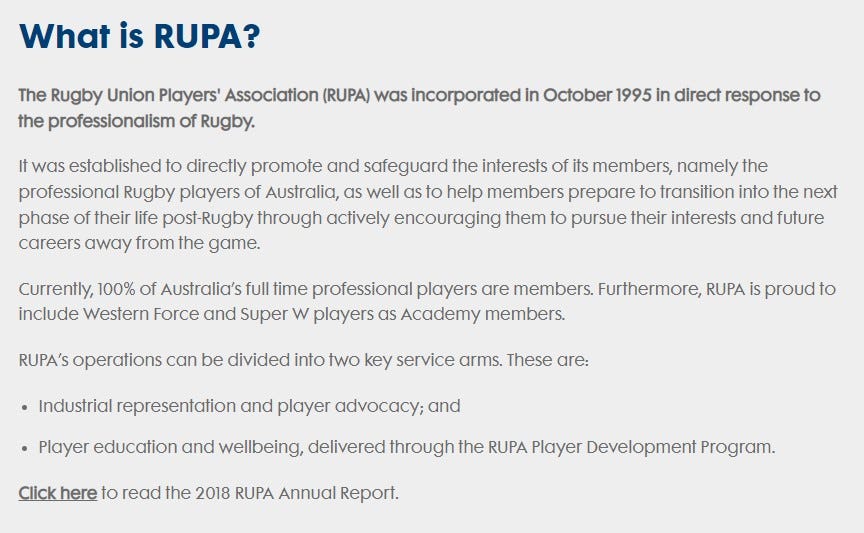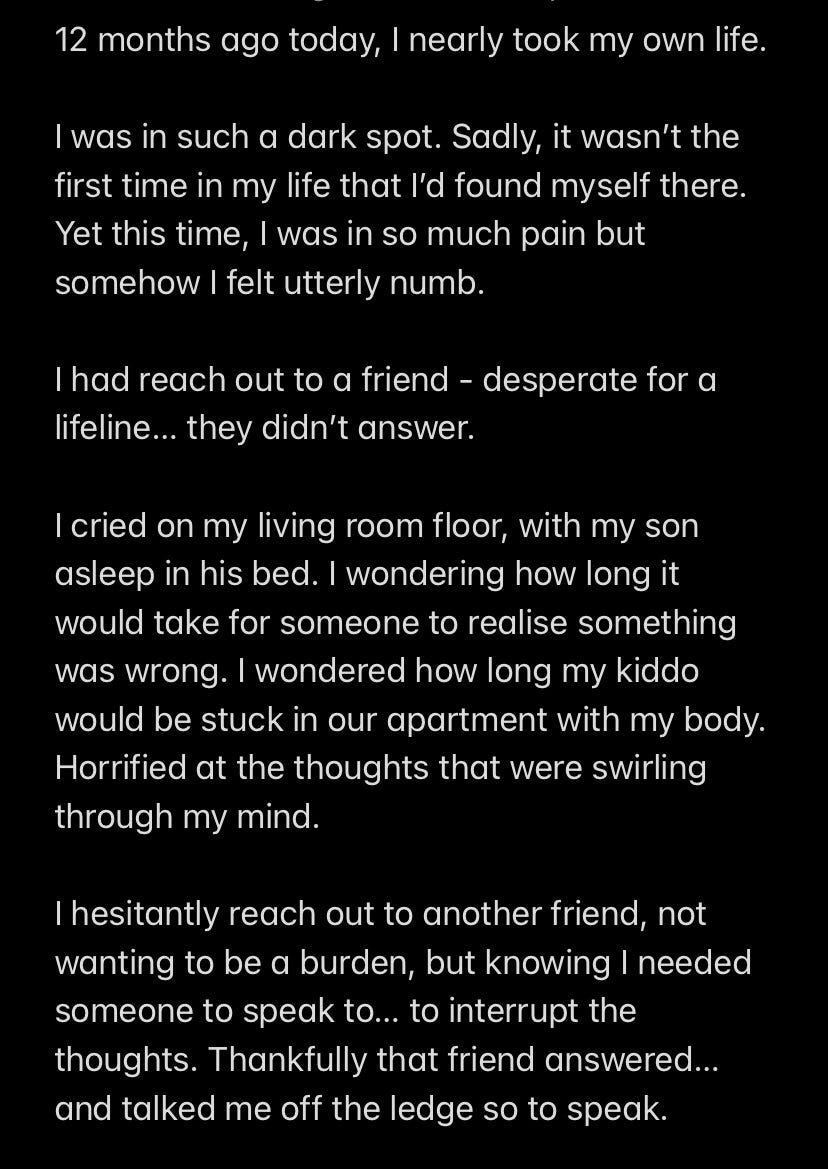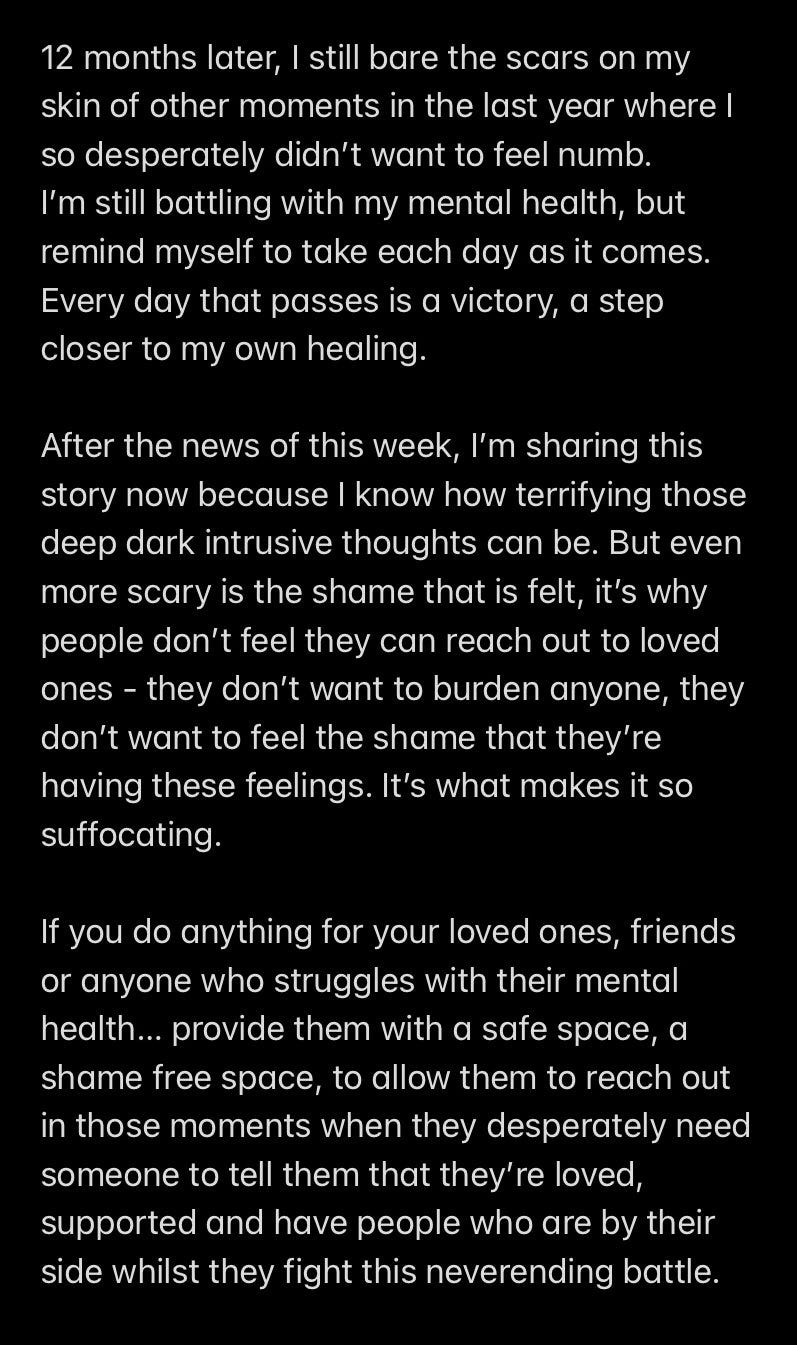Week 17
The Missing Link
This week, all I am going to say on my sobriety is that I have now been sober 17 weeks. 119 days. I’m doing well.
I can’t spend another week sitting here crapping on about how I feel when there are others who are currently going through so much worse. That’s not to understate the importance of my own feelings or current mental state, but this week it just doesn’t feel right.
I just want to preface this blog with a warning that some of the content may be confronting for some. I think though it is very important that the matter is discussed in an honest and up front matter.
RIP Paul Green
As most of you would be aware, former Rugby League player and coach Paul Green died by suicide in his Wynnum home last Thursday morning at the age of 49. He’s survived by his wife Amanda and two young children Emerson and Jed.
It’s not for me to expand further into the details Paul’s passing. There’s plenty of articles available online written by people much more qualified than I am.
The thing that stood out to me in the days after Paul’s passing was the common theme that absolutely nobody had any clue that Paul was struggling. Johnathan Thurston only spoke on the matter for the first time yesterday, while still clearly shaken, he mentioned he was angry and confused. He said that Greeny was always the one that people could go to for a chat about anything and everything. The Saturday before his passing, Paul was at an Old Boys Day at his former club, The Cronulla Sharks. All who were there reported Paul was in a jovial mood. He was talking excitedly about the prospect of a future coaching role with new NRL club The Dolphins. Anyone who interacted with Paul that night who has since spoken publicly all echoed the same sentiment. Shocked and surprised that someone could be struggling so badly, yet hide it so well only five days earlier.
It made me think, are we missing a link? Maybe it’s time to cut through the shit?
<blockquote class="twitter-tweet"><p lang="en" dir="ltr">It’s human nature for us to want to know & understand how/why this could happen to Paul Green.<br><br>It is not our right to know, though.<br><br>It is our responsibility however, to do what we can, to ensure that those struggling know that this is not the only option.<a href="
11, 2022</a></blockquote> <script async src="https://platform.twitter.com/widgets.js" charset="utf-8"></script>
After flicking through twitter I felt compelled to tweet the above. I got a bit of traction, woo-fuckin’-hoo, got some likes. At the time, I felt it was an apt thing to say. I saw people arguing over whether or not it was appropriate to want to know more about the circumstances of Paul’s death. It’s a tricky one for me. I believe it’s human nature to be curious when someone of such significance dies so unexpectedly. Maybe people were after that information too soon? Maybe people went the wrong way about trying to attain that information. Maybe people were trying to shoot others down to get some valuable likes to make themselves feel good. I really don’t know.
I did notice though, that twitter was a wash with heartfelt, genuine tweets about Paul’s passing. Most of which followed up with a message for people to reach out if they ever needed to talk. Some even posted phone numbers to services like Life Line and Beyond Blue. I even noticed a significant lack of the old “it’s a cowards way out/suicide is selfish” bullshit rhetoric, which is an indication that we might just be on the right trajectory. It was really fuckin’ lovely to see. People, who in most cases are no more than friends from the internet, offering themselves and their time up for anyone who may at any point need someone to talk to. A pleasant change from the usual rambling of twitter and in particular NRL Twitter. Both of which can be a pretty ugly place at times.
The more I thought about my own tweet and the rest that I read of a similar theme, the less I seemed to appreciate it. The reason? I don’t think we’re doing enough. We like to say these nice things, often times we mean them sincerely too, but people are still dying by suicide in drastic numbers. Is it all just bullshit? Are we posting shit like this then walking away thinking “oh well, I’ve done my good deed for the day, the rest is up to everyone else”? Ok, maybe we’re not quite that bad, but I can’t help but feel like sometimes these messages are somewhat hollow. Obviously we mean what we say, it would take a real fuckin’ asshole to turn away from someone who had come to them for help, especially around something so serious and significant, but why are some people not taking people up on these offers?
We’ve never had as much support in this space as we do right now. I’d argue almost everyone is aware that they can access some kind of help with relative ease should they seek it. I think of you asked most people Australians what Life Line is, they would be able to tell you. Organisations like Life Line do amazing work, they save thousands and thousands of lives. I’m not for a second diminishing the work that they and similar organisations do. Clearly though, we as a community are not doing enough.
So what the fuck are we missing? For some, there seems to be a missing link. We know that support is out there. We know it’s free, we know it’s only a phone call away, yet people still suffer in silence, often to the point of suicide.
I think I know some of the answers, some of which come from lived experience, others from listening to others about theirs. Often people in this situation aren’t fully capable of rational thought. They are being driven entirely by their emotional brain. I think at times the thought is “I know there is help there, but they can’t help me. They can’t give me the kind of help I need”. Another one is the burden. People have such a low view of themselves when they are depressed that they feel like they aren’t worth others people’s time and energy. They don’t want to bother others with “their” problems. Almost like they have such a diminished view of themselves that they feel undeserving of the help.
It’s easy to sit here and say, here’s a problem, there’s the solution, put the two together, problem solved. What we need to remember is depression is an illness. No different to a physical illness. Sometimes, people get ill with no known cause, no known trigger. Which brings me to the last and possibly most significant reason I can think of why people don’t reach out for help. Reaching out for help is fucking terrifying. This illness can put a person so deep in a mental hole that it doesn’t matte how many services are around them, reaching out for the help that you don;’t think will help you anyway, is way fuckin’ scarier than ending your life.
Maybe earlier intervention is key. Getting people help before they fall too deep into the hole so the road ahead seems a little less daunting. Maybe it’s education, maybe people aren’t aware that they are starting to fall into the hole until it’s too late. I know I didn’t. I just thought I was having a rough trot, that some luck would fall my way and it would fix it’s self. It didn’t and it doesn’t. As the saying goes, nothing changes if nothing changes if nothing changes.
Ultimately, I don’t know all the answers. Nor should I. It’s not up to an individual to provide the solutions here. It’s up to all of us as a community. Although I agree we are on the right track as a whole in terms of mental health awareness, now isn’t the time to sit back and think, “yeah sweet, we’ve implemented this and everyone is aware of it, lets move on”. This shit isn’t set and forget. We need to capitalize on the momentum generated and double down.
I think we are the missing link. All of us. We need to keep having these conversations regularly. Not just when someone famous or someone you know is effected. It doesn’t have to be invasive or too direct. don’t use “how ya garn” as just the greeting we’ve come to know it as. Answer it as the question it is, listen to the answers. We should thrive to get to a point where being aware of these issues, knowing what to look out for, what the early signs are, are in all of our minds at any given time. I believe that it us that are that missing link. We need to help each other. Be the link between the problem and the solution.
I wish in Paul’s case he’d have asked for help, I hope he’s found the peace he was looking for.
My thoughts are with his loved ones.
RIP Paul Green.
Why are some industries more prone than others?
It’s been long reported that former professional athletes, current and former members of the armed forces, emergency service workers/health workers, farmers FIFO struggle a lot with mental health issues. Again, I don't think there is a lack of support. I think it’s more to do with the above mentioned reasons as to why they don’t seek out the support.
Monash University report identifies occupations with greater risk of suicide
I think there’s similarities in some of the industries and also some attributes exclusive to each as well. I’m not comfortable enough in my knowledge of these industries to comment on them all, so I’ll stay in my lane here. There’s a report attached to the above link for anyone who wants to research it further. I think we could do well to be a little more aware of the industries people who are more prone to suicide work in to better equip ourselves to identify people who are struggling.
Athletes
There’s no shortage of articles online about professional athletes struggling to readjust to life after retiring.. It’s believed they often struggle to adjust due to the routine that being a professional athlete provides them. Be here at 7 to stretch, strapping at 7:30, on the field at 8 etc. to go from 10-15 years of that strict routine, managers giving you itineraries to follow, to walking away after a celebration of your career to waking up a week or so later thinking, what the fuck do I do now?
Fortunately, a lot of organisations identified this a long time ago and have since put measures in place to help athletes transition into life after retirement.
Former Wallaby, Brumby and now someone I’m fortunate enough to call a friend has a great blog about his struggles with mental health post-career.
In one of his recent blogs Benny touched on the passing of the tragic passing of Wallabies and Brumbies team mate Dan Vickerman. Dan even had a role in the Rugby Union Players Association. The below screen grab is from the RUPA “about” page.
Dan was working for the organisation that was there to help players transition out of the game into their next phase of life. Which to me shows that someone can be so well aware of the help that is available, so conscious of it, but can still be so crippled by this illness. It’s difficult to see this and not think “well if someone like Dan couldn’t get the help he needed, what hope do we have”. Whilst i can sympathize with that sentiment, we simply must have to keep on trying. It is possible to save lives with a conversation, the below links are proof.
How a phone call saves Owen Craigie's life
How John Lang saved Preston Campbell's life
Medical professionals/Emergancy services/Armed forces
This isn’t one I feel overly comfortable commenting on, however I wanted to share an article about my mum’s friend and colleague Dr Peter Scott who died by suicide on May 26 this year. I’ve spoken about this on previous posts so I won’t say too much except for the world lost a brilliant obstetrician and a great man that we didn’t have to lose.
You never forget people like Dr Peter Scott who helped to deliver your baby into the world
I also wanted to share this link. There’s a lot to unpack here and I’ll leave it up to you to do so should you want to.Personally, I found it pretty shocking.
Five AFP Officers Die by Suicide in Two Years
Where to from here?
When famous people pass, it’s brought to our attention but this shit happens every single day, multiple times. See below comments from radio and TV personality Gus Worland.
Mental fitness advocate and founder of the Gotcha4Life foundation, Gus Worland, said Green’s death draws a “line in the sand” for Australians.
“Unfortunately, we lose seven blokes a day every day, two women a day every day, we have people attempting suicide at a rapid rate in Australia. So when someone famous, takes their own life, all of a sudden that shines a light on it,” he told news.com.au.
“But it also should make us realise it’s not just about this moment, but how many other families and communities that have that ripple effect that’s ripping through them right now.
“So at some point, we need to put that line in the sand and say ‘You know what? No more’. We have to really start looking after ourselves better.”
I wanted to share this because I too have been guilty of not remaining conscious enough of just how serious suicide and mental health issues remain in Australia. Even as someone who has had ongoing mental health battles for the last 15 years or more. We get swept up in the stress of our won lives. There is nothing wrong with that, it happens, we can’t hang shit on our neighbors for having a shitty backyard if we haven’t mowed our own lawn.
I’ve spent some time thinking about this missing link. It took me back to the Alcoholic Anonymous rooms. What i took away from my experience in the rooms was pretty simple. A group of like minded people come together and openly discuss their drinking and the damage it caused in a completely comfortable space. It’s raw, confronting, often sad but very powerful. I remember I would go on Friday afternoon. Literally perfect timing for a young weekend warrior. I would leave the meeting feeling invigorated. Motivated and inspired to go another week without drinking. Most people in AA will say that they don’t know how or why it works, but it works.
This got me thinking, could the same theory be applied to people who have depression and/or experiencing suicidal thoughts?
Since I started this blog I have been blown away with the amount of people who have reached out and said that they have resonated with a lot of what I have said. Some have told me that reading the blog each week has helped them.
Personally, when I hear the story of someone who has been battling, there is a comfort in it. When my own mental health issues escalate, I feel very unique in my battles. Like I am an outcast, i don’t fit in. I’m sure a lot of you are the same. So when I hear that someone else has similar struggles I feel a massive sense of relief. Firstly because I know that I am not the only one. Misery loves company. If someone else is feeling like I am, maybe it’s ok for me to feel like this. Secondly, maybe I’ve just found someone who I can talk to about my problems. We don’t necessarily need professionals every single time. We don’t need to be able to talk to every single friend we have about how we are feeling, but if you can find a couple of bankers who “get it”, sometimes they can be all the help you need on that particular day. I think that little layer of safety can mean the difference between your problems getting worse and at the very least keeping them at bay for a little while longer.
I saw this posted on twitter the other day and have gained the authors permission to share it. I wanted to share it because I found comfort in it too and think we need to encourage more people to share their story.
Personally, i find stories like that comforting. I understand it could be a little too much for some people. I would be interested to know what people think though. Could something as simple as sharing stories have a significant positive impact on people who are struggling? Leave a comment.
I know this week has been a little bit darker than what you’re used to from me, but I can’t apologise. it Shouldn’t have taken the passing of someone famous for us to have conversations like this. Growth comes from outside our comfort zones.
Cheers, Wankers
X
If anyone is struggling please call Lifeline 13 11 14









I find myself asking the question... what are we missing?
I only have more questions in trying to answer it but I agree, I think we’re heading in the right direction.
Great article again, mate.
Been thinking about this subject a lot this week. Not for me. I'm in a good spot right now. But two specific cases that are intertwined and ultimately ended in tragedy. And what I could've done differently to help both people.